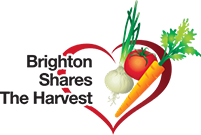Healthier Planet, Healthier You
- By Linda Young
- •
- 17 Nov, 2019
As a Nonprofit that’s all about connecting people to fresh produce, we usually write and talk about ways to get more produce into your daily diets. We aren’t encouraging people to become vegetarians or vegans, just to eat more fresh produce. But we’re all going to be hearing a lot more, from a variety of sources, about why you should also consider eating less meat, and it’s not all about your health. It’s about the health of the planet as well.
5280 Magazine (5280.com) has an article in the September 2019 issue called “Meat Matters” about the practice of regenerative agriculture, a way of grazing grass-fed animals that is better for the animals and much better for the land, and meat from these animals is better for your health. If you’re one of those people, as I am, who prefers not to think about feedlots and commercial slaughterhouses, you might want to learn about how those practices impact the environment (manure pollution of waterways, as just one example), and what the true cost of cheap meat is to you, the animals, and the environment.
What’s a responsible consumer to do, especially working families that cannot afford to pay $26 for a chicken? Educate yourself on where your food comes from, and how the meat you’re buying was raised. Consider trying some of the new plant-based meat substitutes (we’ll all be hearing more about those, too). This is not without controversy; you can read about a new “Better with Beef” campaign:
www.journal-advocate.com/2019/09/04/colorado-beef-industry-launches-education-campaign/. Beef is a major industry in Colorado, and it’s definitely possible to find beef that has been raised responsibly. Colorado has a beef council: www.cobeef.com.
While you chew on all of this info, we encourage you to continue to include fresh fruits and vegetables in your meals and snacks. Dried beans, while technically not “fresh” produce, are minimally processed, and are an excellent source of very affordable protein; they can be cooked and used as a main ingredient or a minor player in salads, soups, stews, casseroles, burritos, and many more dishes. Dry beans are easy to cook and you can find numerous recipes online.
Our website, www.BrightonSharesTheHarvest.org, has additional information about how you can access, or share, fresh healthy produce, including additional nutrition resources under the Get Produce tab. For additional questions about our services, please contact our Director, Linda Young, at 720-301-0949 or Linda@BrightonSharesTheHarvest.org.
Share
Tweet
Share
Mail
HOW YOU CAN SUPPORT BRIGHTON SHARES THE HARVEST’S MISSION
We receive a 20% rebate on all Botanical Interest
seed orders placed through this link
or click the image above to browse to their website and place an order.
CONTACT BRIGHTON SHARES THE HARVEST
Didn’t find what you were looking for on our website, or need additional information?
Please contact us.
© 2024
All Rights Reserved | Brighton Shared The Harvest
